Blog
Cloud Phone System
What is Cloud Phone System? A Guide for Small Businesses and Startups

What is Cloud Phone System? A Guide for Small Businesses and Startups
Read what a cloud phone system is, how it works, its key features, and the benefits it brings to small businesses.
In the past, setting up a business phone system meant investing in expensive infrastructure: desk phones, PBX boxes, and cables running through office walls. That setup no longer fits today’s environment, where many companies operate remotely or in hybrid models and look for solutions that are both affordable and easy to manage.
That’s where cloud phone systems make a difference. Instead of relying on bulky on-site hardware, a cloud-based phone system runs entirely over the internet. It delivers enterprise-grade calling features that scale with your business, without the complexity or upfront costs of traditional setups.
In this guide, we’ll cover what a cloud phone system is, how it works, its key features, and the benefits it offers. You’ll also learn why this technology is especially well-suited for small businesses and startups, and how to choose the right provider for your needs.
What is Cloud Phone System?
A cloud phone system, also known as a cloud based phone system, business phone systems in the cloud, cloud PBX phone system, or virtual phone system, is a communication solution hosted online that relies on VoIP (Voice over Internet Protocol) technology to handle calls. Put simply, it’s software that enables businesses to make and receive calls over the internet, eliminating the need for landlines, desk phones, or complex wiring.
Cloud phone systems deliver the same core calling features as traditional PBX systems, but with the added flexibility and advanced capabilities that VoIP provides. The entire solution is managed remotely by the service provider, reducing the burden on your in-house IT team and ensuring reliable performance.
Cloud Phone Systems vs VoIP Phone Systems
Although the terms are often used interchangeably, there is a key distinction between them. VoIP phone systems use the internet to transmit calls, but they don’t have to be hosted in the cloud. A business can run a VoIP system on its own on-premises servers or choose to outsource hosting to a cloud provider.
A cloud phone system, on the other hand, is always hosted in the cloud and relies on VoIP technology to transfer call data. In other words, all cloud phone systems use VoIP, but not all VoIP systems are cloud-based.
Cloud Phone System vs Traditional Phone System
The difference between a cloud phone system and a traditional setup is substantial. Traditional phone systems require on-premises hardware, such as PBX boxes and desk phones, which come with high upfront costs for equipment and installation.
Maintenance is another challenge: when parts break or become outdated, your team must manage repairs and replacements, leading to added expenses and downtime.
These systems also limit scalability, making it costly to add new lines or support business growth. Long-distance calling can be expensive, and because they rely on the Public Switched Telephone Network (PSTN), they’re tied to physical desk phones, making remote work and mobility difficult.
Cloud phone systems, by contrast, provide far greater flexibility. They eliminate the need for bulky equipment and allow employees to make and receive calls from any internet-connected device, whether they’re in the office, at home, or traveling. All you need is a cloud phone system provider and a stable internet connection, making setup faster, simpler, and more cost-effective.
How Does a Cloud Based Phone System Work?
As mentioned above, cloud phone systems rely on VoIP technology to handle calls. When you place a call, your voice is converted into digital data packets, transmitted over the internet, and then converted back into audio for the recipient. This process happens almost instantly, delivering call quality that feels the same as, or often better than a traditional phone line. In a cloud setup, calls are routed through a third-party VoIP service provider rather than on-site hardware.
Because the entire telephony infrastructure is hosted by a cloud phone system provider, businesses don’t need to maintain PBX equipment on their premises. On the user’s side, all that’s required is an internet-connected device, such as a VoIP desk phone, computer, tablet, or smartphone, with the system installed.
Why Choose a Cloud Phone System for Small Business Communications?
Every business depends on phone communication, whether it’s supporting customers or capturing new opportunities. To handle these interactions effectively, you need a reliable business phone system.
For small businesses and startups, the complexity and cost of traditional phone systems can feel overwhelming. Cloud-based phone systems offer a cost-effective alternative that comes with significant benefits.
At the same time, moving to the cloud also brings its own considerations, such as internet reliability and provider selection. Understanding both the benefits and the challenges will help you decide if a cloud phone system is the right fit for your business.
Benefits of a Cloud Based Phone System for Small Businesses
-
Lower cost of running your business phone system: Cloud phone systems remove the need for expensive on-site hardware and ongoing maintenance. Instead, you pay a predictable monthly per-user fee, usually far less than traditional business phone bills. Most plans include unlimited domestic calls and messaging, while international calling is significantly cheaper over VoIP. The result: lower, more predictable communication costs.
-
Simple and quick setup and maintenance: You don’t need an in-house IT team to manage a cloud phone system. The provider handles all technical infrastructure and support, while you control your business phone settings through a simple online dashboard. Adding new users, updating call rules, or enabling features takes just minutes, even for non-technical staff.
-
Flexibility and mobility for your employees: Because everything runs over the internet, your team can work from anywhere: at home, on the road, or across multiple offices. Employees can make and receive calls from a laptop, tablet, or smartphone while displaying the same business phone number. This ensures seamless communication and increases employee productivity no matter where work happens.
For businesses with distributed teams, assigning a new phone number is as simple as a few clicks, ensuring global connectivity without complexity.
-
Scalability with your growing business: Your phone system should grow alongside your business. With cloud telephony, adding lines or extensions is as easy as activating a new license or installing an app. There are no hardware limits, so you can scale up or down instantly — perfect for startups and small businesses. Most providers also offer per-user subscription models, letting you control costs by paying only for the seats you actually need.
-
Access to advanced features and integrations: Modern cloud phone systems go beyond basic calling. They provide a full suite of communication tools, from smart call routing to video conferencing and business messaging. Many also integrate with CRM, help desk, and other platforms, ensuring smooth data flow across your business systems.
Explore why a cloud-based phone system is the most beneficial and cost-effective choice for small businesses and startups compared to traditional phone systems.
Challenges of Using a Cloud Phone System
While cloud phone systems deliver major advantages for small businesses, it’s important to be aware of potential challenges before making the switch.
- Dependence on a reliable internet connection: Because cloud phone systems operate entirely over the internet, call quality depends on your connection. A poor or unstable network can result in dropped calls, delays, or reduced audio quality. For businesses with heavy call volumes, investing in strong internet connection and considering backup connectivity is essential.
- Challenges during setup or migration: Although cloud phone systems are easier to implement than traditional PBX systems, the initial setup may still present hurdles. Configuring call flows, integrating with existing tools, training staff, and adjusting workflows can take time. Selecting a provider with robust onboarding and support can ease the process. If migrating from one vendor to another, ensure that number porting is available, so your business retains its existing contact details.
- Security and compliance considerations: Because calls and data are transmitted online, businesses need to ensure their provider offers strong security measures such as encryption, secure data storage, and compliance with industry standards (like GDPR or HIPAA). Evaluating these safeguards is essential for protecting sensitive business and customer information.
Choosing the Best Cloud Based Phone System for Your Business
While it might seem like cloud business phone system providers are all the same, but they’re not. To find the right fit for your small business, keep these factors in mind:
- Ease of use: A phone system should simplify communication, not complicate it. Look for solutions with intuitive dashboards and straightforward setup processes, so your team can start using the system with minimal training. User-friendly systems also reduce the need for constant IT support.
- The true cost of ownership: Pricing goes beyond the monthly subscription. Consider additional costs such as international calling rates, premium features, number porting fees, or equipment if you choose to use VoIP desk phones. A transparent provider will make it easy to understand what you’re paying for and how costs may change as you grow.
- Features and integrations: Every business has unique needs, so the best provider is one that offers flexibility. Make sure the system includes the core features you need today and integrates with tools you already use like CRM, help desk, or collaboration platforms.
- Fast and efficient customer support: Strong support can save you time and stress, especially during setup or if issues arise. Look for providers with responsive customer service available through multiple channels (chat, phone, email) and a reputation for helping small businesses get the most out of their system.
Must-Have Features of a Cloud Phone System
When evaluating a cloud phone system for your small business, these core features should be non-negotiable:
Call Routing
Smart call routing is at the heart of a professional phone system. With cloud phone solutions, features like auto-attendants and IVR menus greet callers, guide them through options, and either connect them with the right person or provide self-service. You can also set custom business hours to automatically direct calls based on your schedule, ensuring customers always reach the right destination, whether during office hours or after.
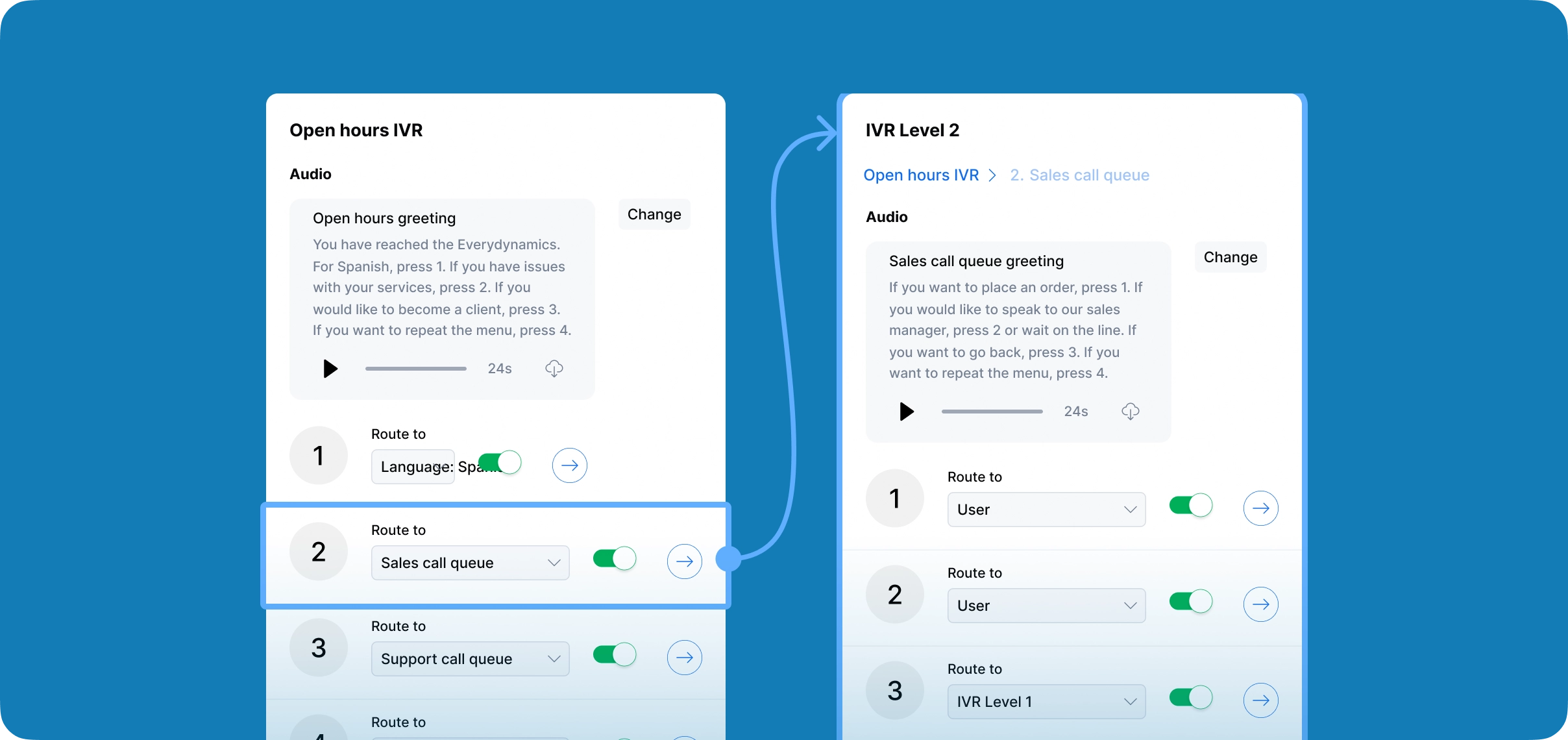
Call Forwarding
Call forwarding ensures you never miss an important call, even when you’re away from your desk. With this feature, you can redirect incoming calls to an alternative business line, a colleague, or even your personal cell phone.
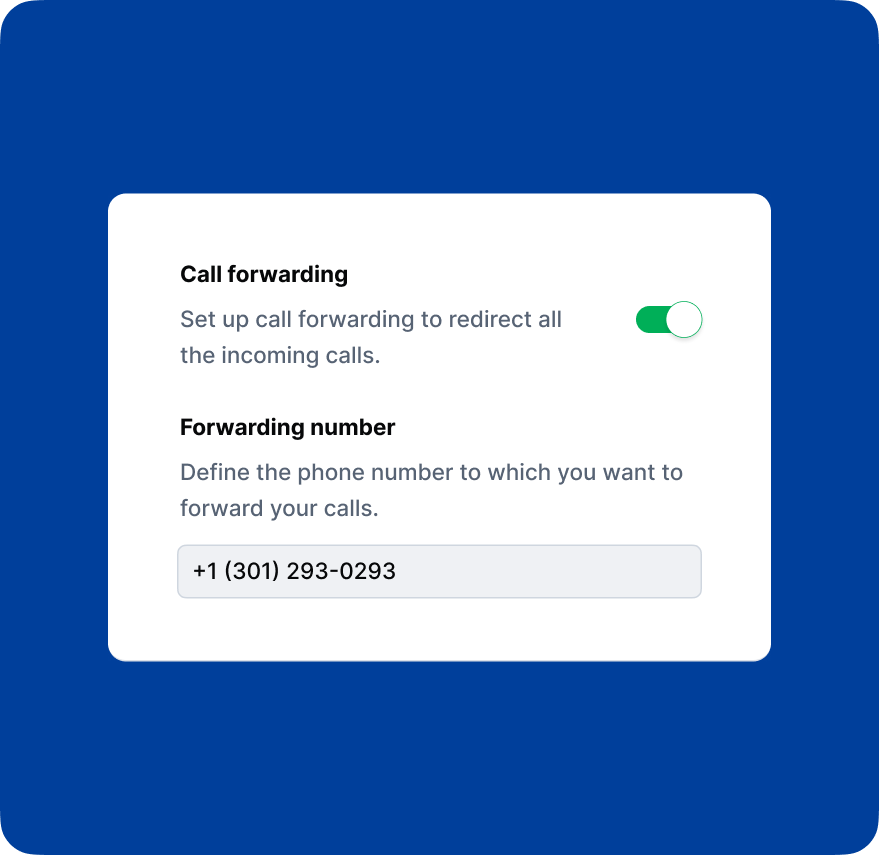
Call Transfers
Call transfer allows you to seamlessly redirect a caller to another phone number without requiring them to hang up and dial again.
With a warm transfer, you can place the caller on hold while you brief the next agent, ensuring they have the context needed before picking up the conversation. This approach creates a smoother handoff and improves the overall customer experience. A cold transfer, on the other hand, instantly routes the call to the right teammate or department without placing the caller on hold, making it ideal for quick redirection when no additional context is required.
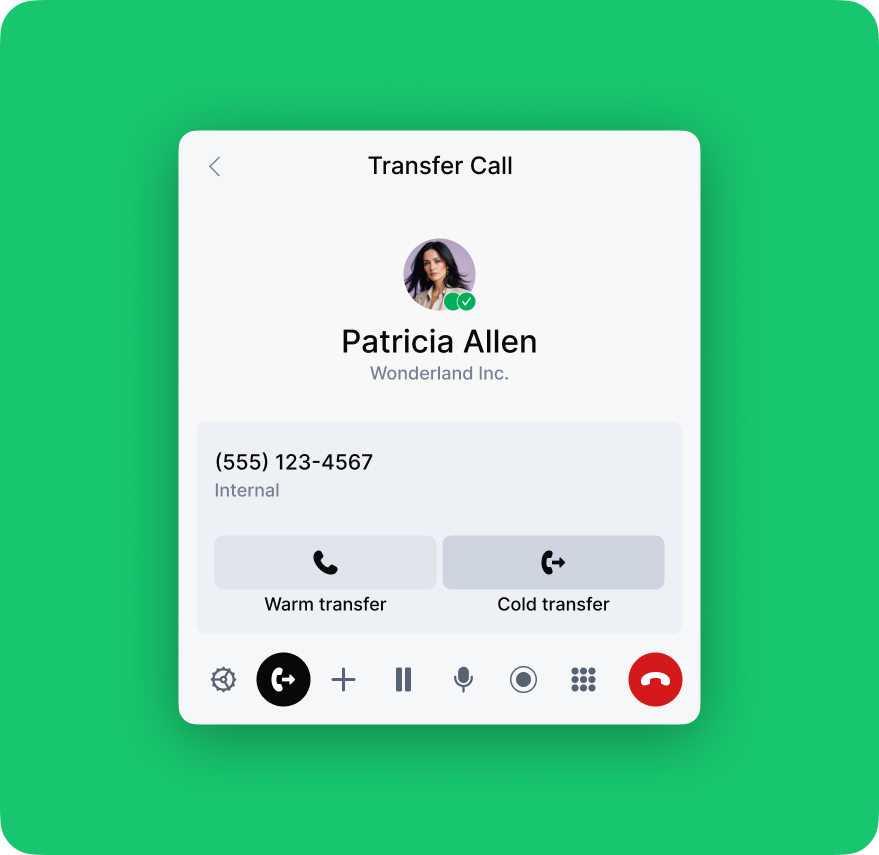
Voicemail
Missed calls are inevitable for any business, but a voicemail feature ensures that messages are never lost. Traditionally, employees had to dial into a system to retrieve messages, which could be time-consuming and prone to delays.
Modern cloud phone systems take voicemail further. Some providers, such as DialLink, offer voicemail-to-email delivery, sending messages straight to your inbox as audio files for quick access. Advanced options even include voicemail transcriptions, allowing you to read messages on the go without needing to listen. These features make follow-ups faster, keep records neatly organized, and ensure important customer requests are addressed promptly.
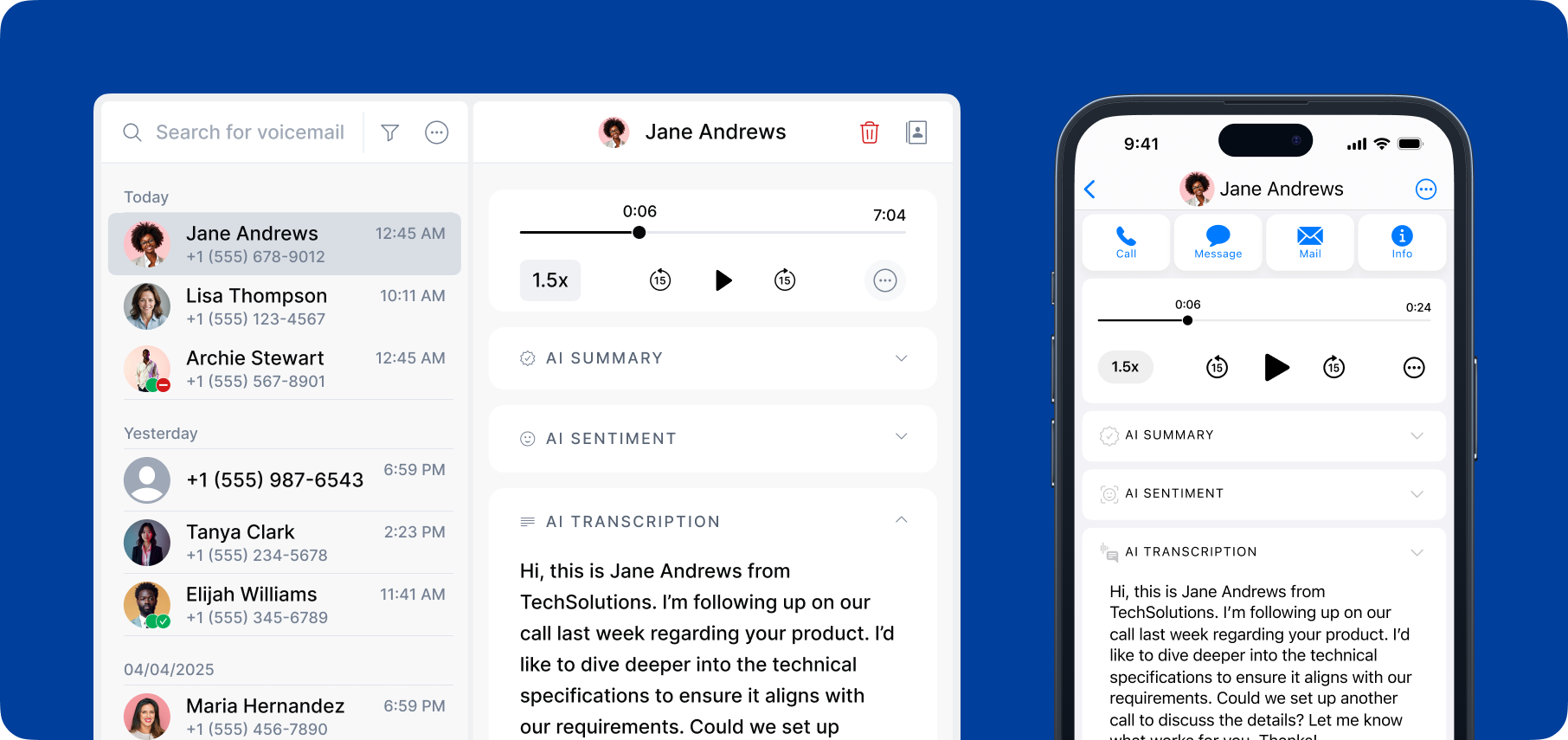
Customizable Caller ID
Appear professional no matter where your team is calling from. With customizable caller ID, employees can display your business name instead of their phone number when making outbound calls. This not only strengthens brand credibility but also ensures consistency for customers who recognize your number.
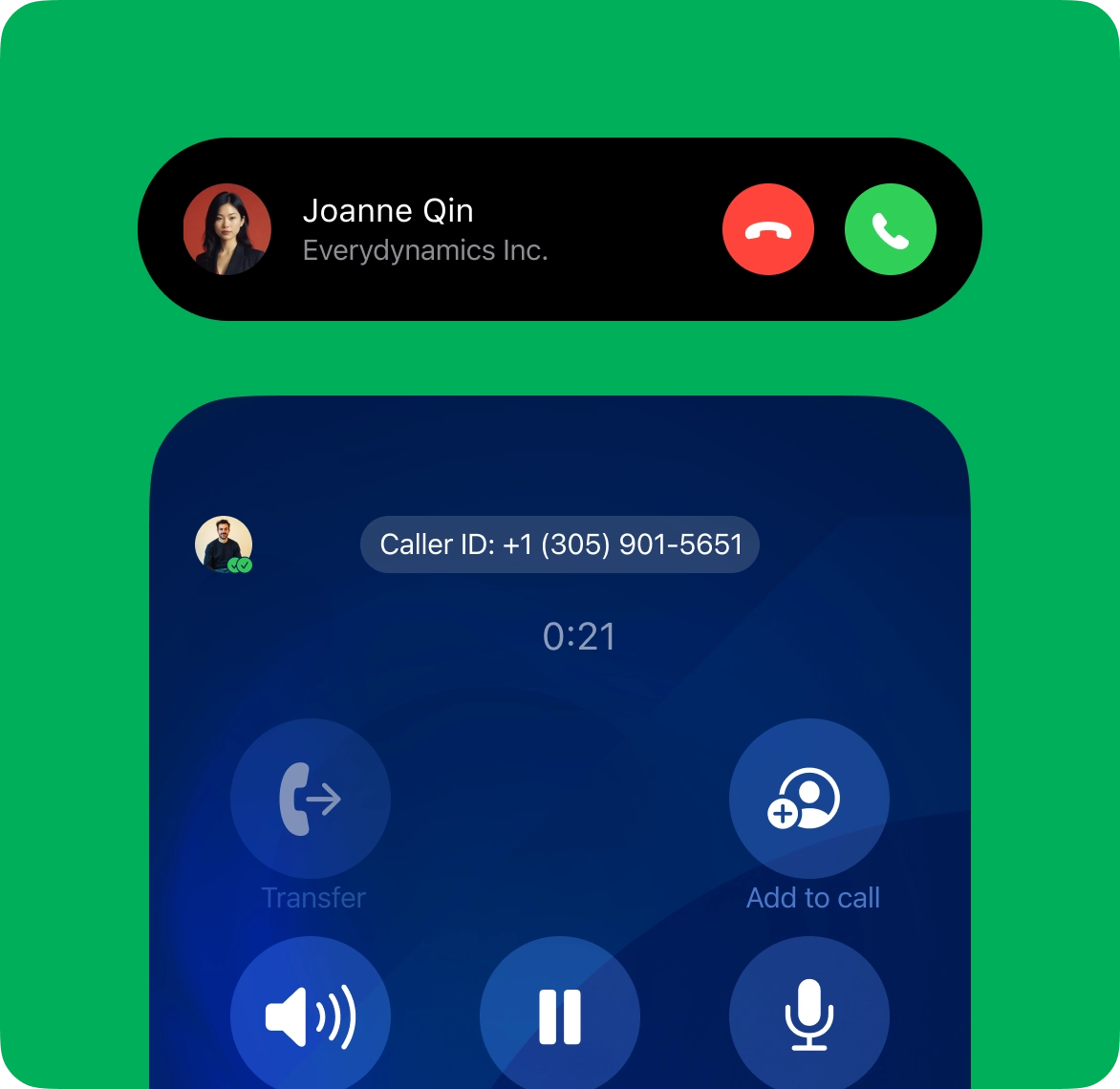
Local & Toll-Free Phone Numbers
A cloud phone system allows you to instantly set up local phone numbers in different regions, helping your business build trust and a local presence. For nationwide reach, toll-free numbers give customers an easy way to connect without extra charges. Both options make your business more accessible and customer friendly.
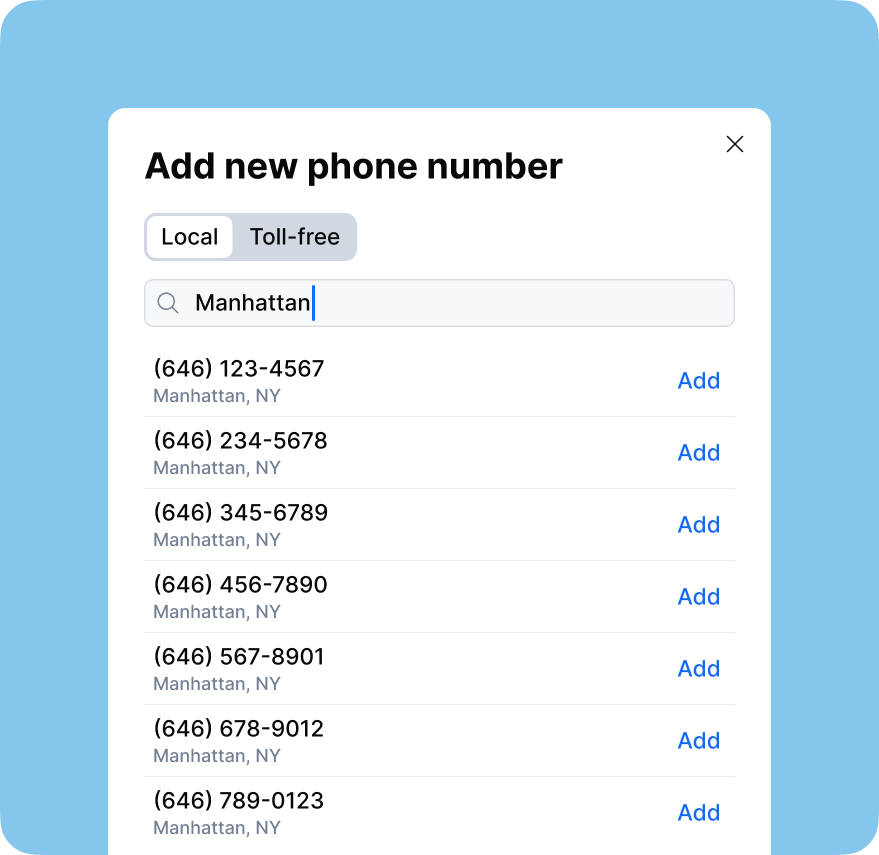
Integration Capabilities
Cloud phone systems integrate with popular tools like CRM platforms (HubSpot, Salesforce), help desk software (Zendesk, Intercom), and productivity apps (Slack, Microsoft Teams). These integrations ensure data synchronization across systems, reduce manual entry, and give your team real-time context for each customer interaction, improving efficiency and service quality.
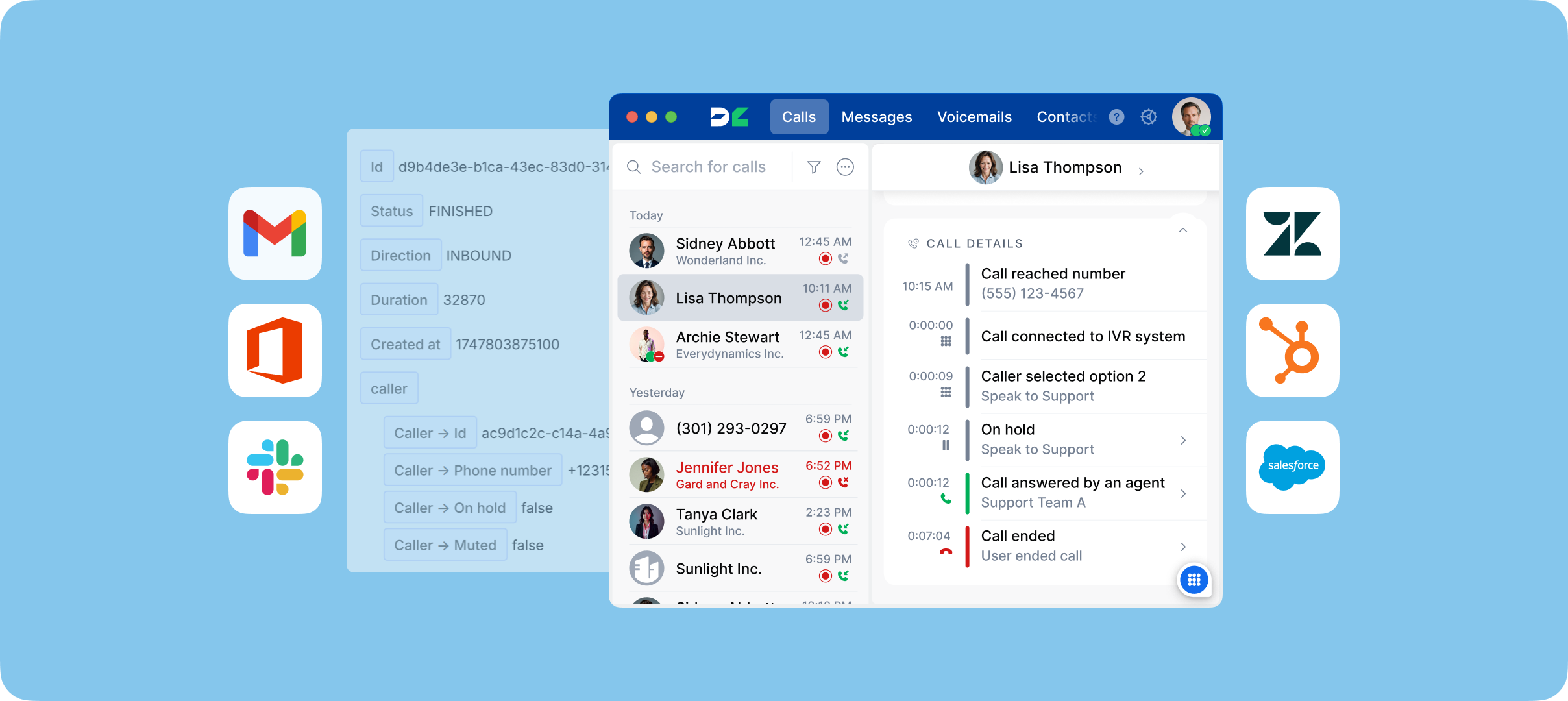
Multi-Device Access
Your phone system should work wherever your team does. With multi-device access, employees can make and receive calls on smartphones, tablets, laptops, or VoIP desk phones, all tied to the same business number. This flexibility is essential for remote work, travel, and hybrid setups, keeping teams connected without being tied to one device or location.
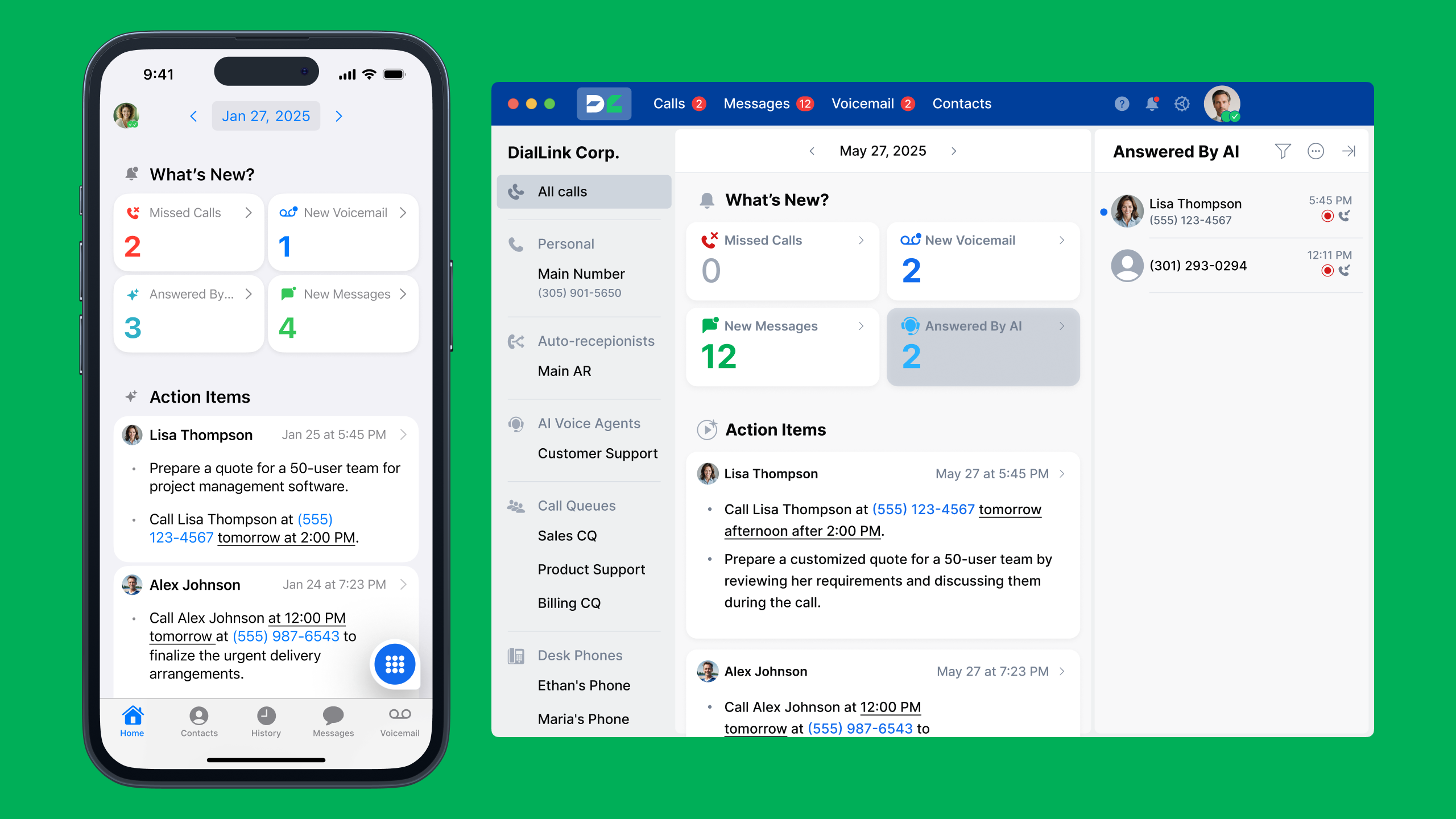
Analytics & Reporting
Analytics turn everyday call data into actionable insights. With a cloud phone system, you can track key metrics such as call volumes, response times, missed calls, and team performance. Many systems also include a detailed call history, showing how each call was handled from the initial routing and transfers to resolution, giving managers full visibility into the customer journey.
These reports help you identify trends and uncover areas for improvement. By leveraging data-driven insights and call history, businesses can streamline operations, coach employees more effectively, and deliver a consistently better customer experience.
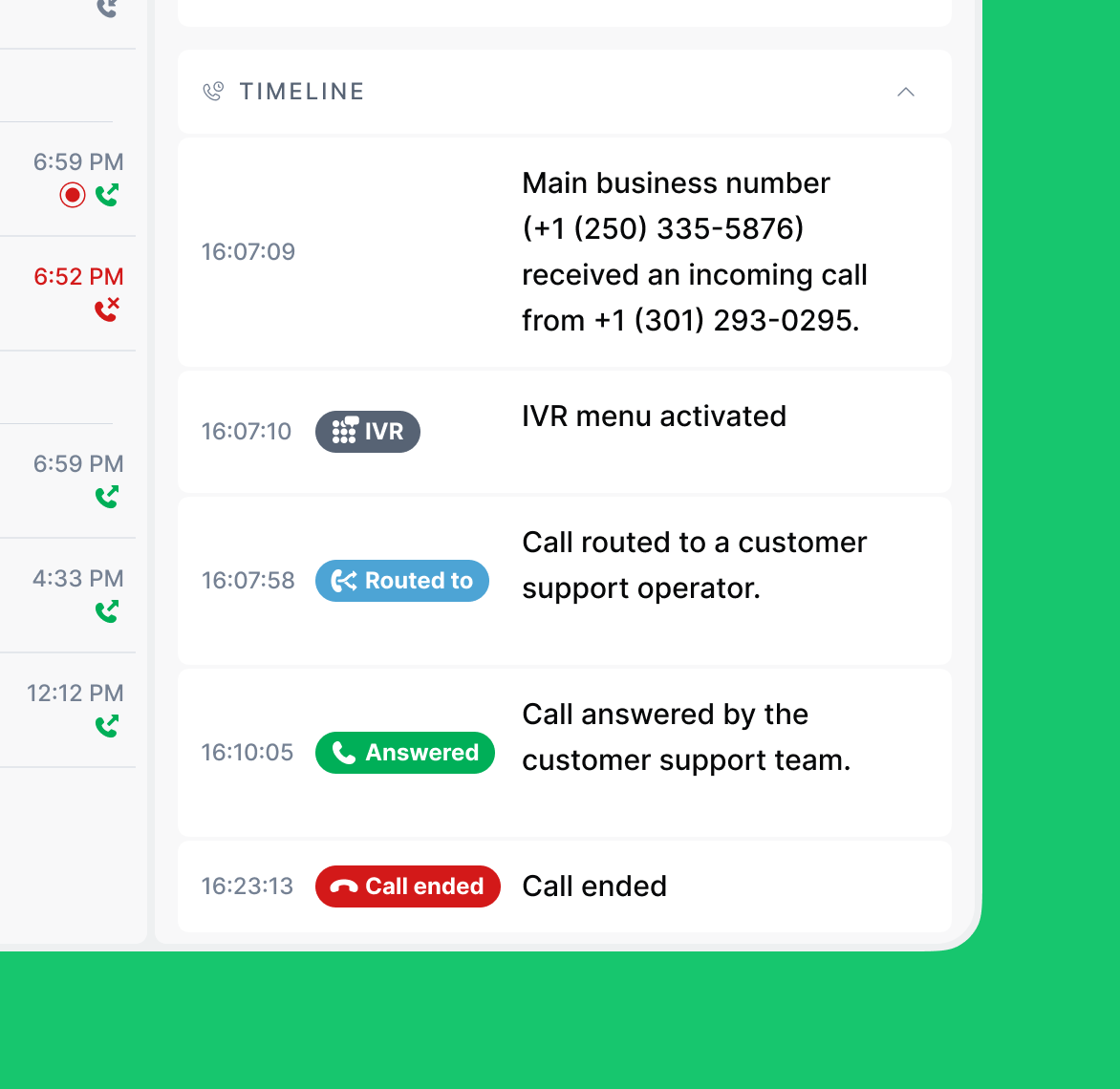
Advanced Cloud Phone System Features with DialLink
Beyond the essentials, modern cloud phone system providers like DialLink offer advanced tools that give your businesses an edge:
Call Queues
Call queues keep customer interactions organized when multiple people are trying to reach your business at the same time. Instead of callers hearing a busy signal, they’re placed in a virtual line with hold music or custom announcements until the next available team member can assist them.
Modern cloud phone systems go a step further by offering automated callback options, allowing customers to request a return call instead of waiting on hold.
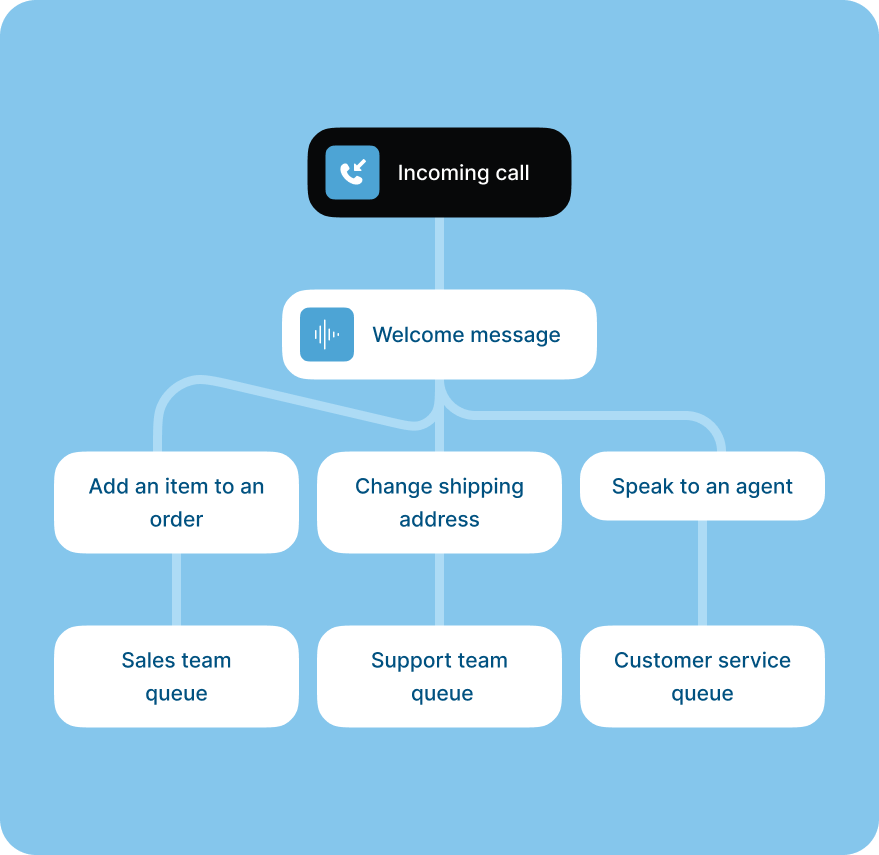
Call Recording with Transcriptions
Call recording is a powerful feature for training, quality assurance, and compliance. With transcription capabilities, recordings become even more valuable, turning conversations into searchable text that can be quickly reviewed, analyzed, or shared. This makes it easier to track commitments, document customer requests, and maintain accurate records without manually replaying calls.
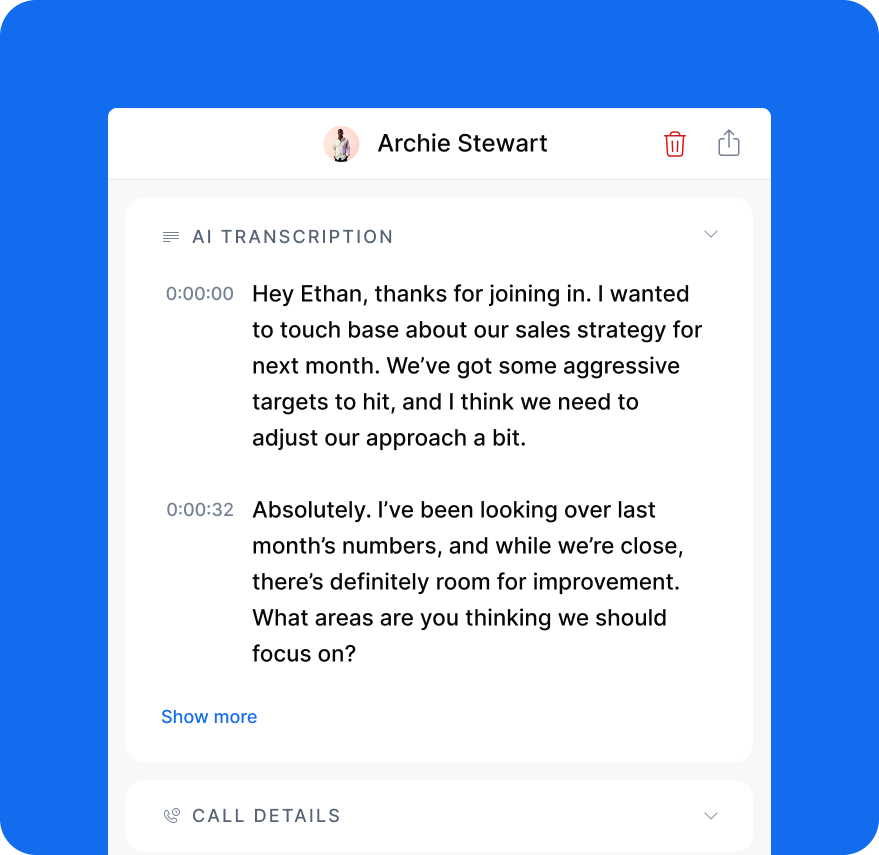
Custom Greetings
First impressions matter and custom greetings allow you to set a professional tone from the start. Whether tailored for different departments or holidays, these recordings create a polished experience that reinforces your brand and ensures callers feel welcomed.
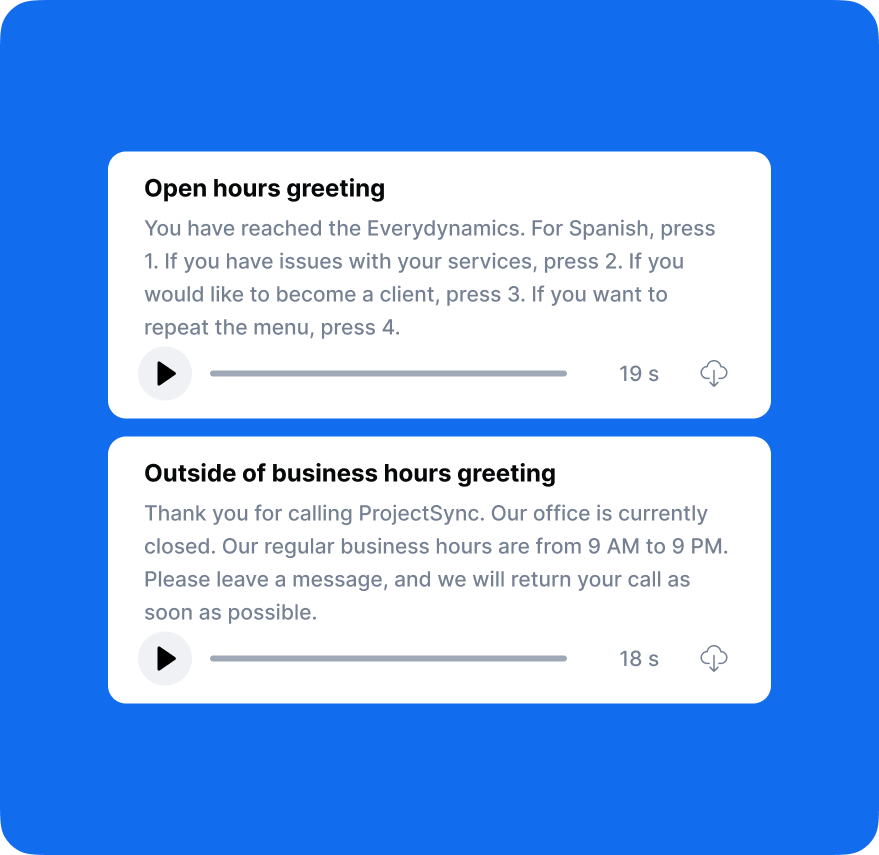
Automated Number Porting
Switching providers shouldn’t mean losing the phone numbers your customers know and trust. Automated number porting ensures your existing numbers transfer seamlessly to your new cloud phone system, reducing downtime and avoiding disruption to your business communications.
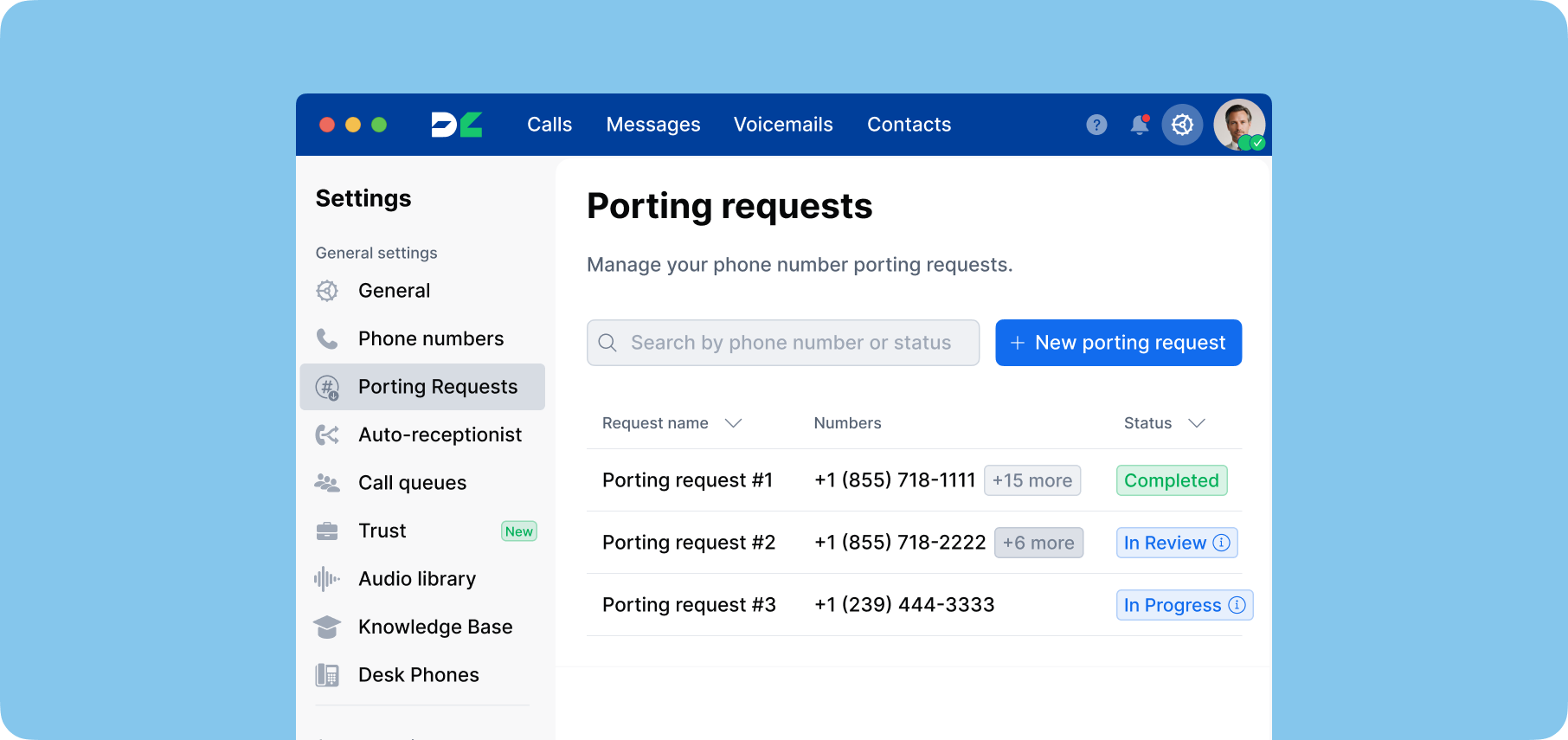
AI Call Handling
AI-powered call handling takes routine tasks off your team’s plate. AI voice agents can answer common questions and warm-transfer calls to the right person based on predefined keywords. DialLink’s MCP-enabled AI voice agents can go even further, integrating with your business tools not only to retrieve data but also to perform actions on behalf of your business.
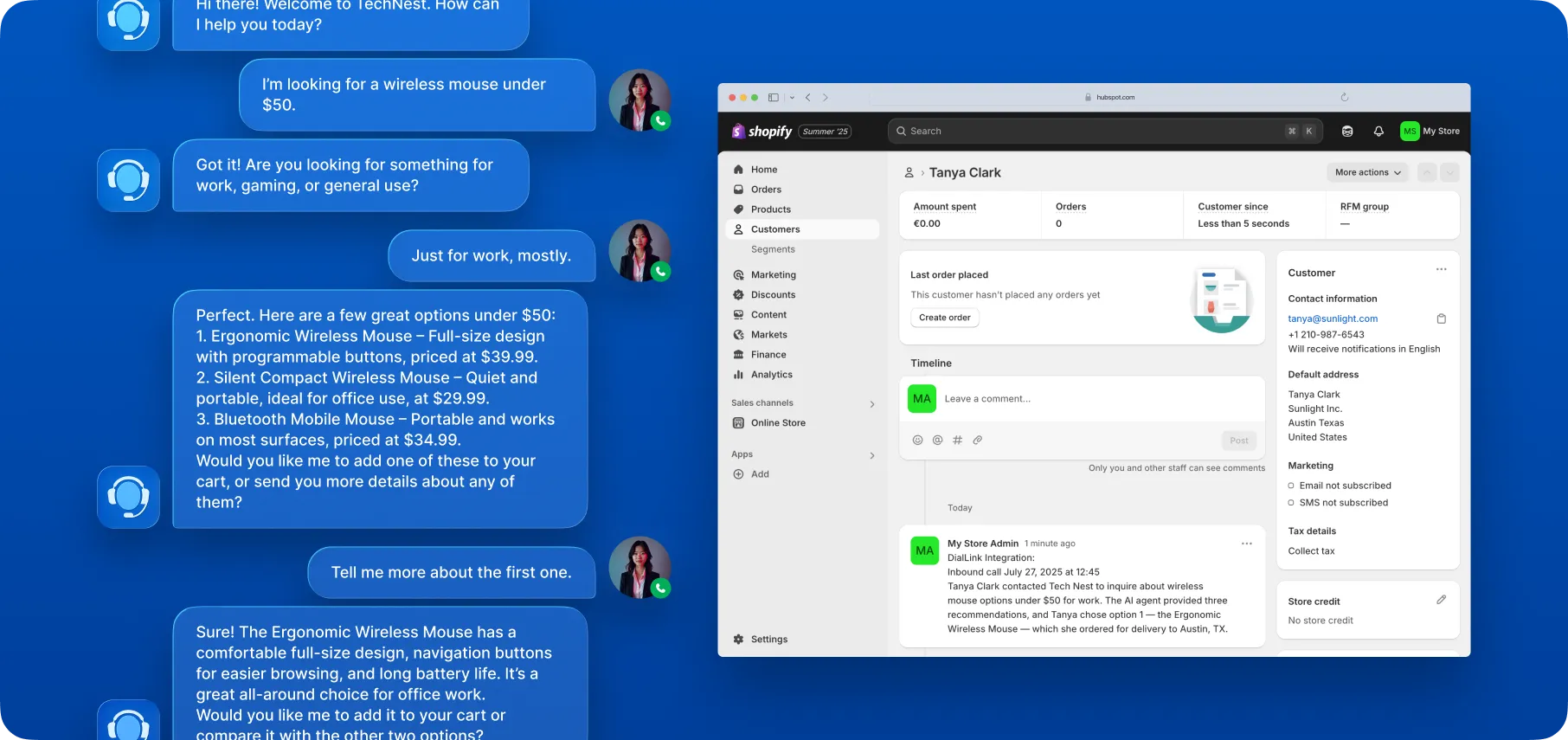
AI Call Intelligence
Beyond handling calls, AI can also analyze them. Features like AI-generated call summaries and action items help teams quickly grasp the details of a conversation without listening back. Sentiment analysis helps you track the emotional tone of your calls. AI call tagging improves organization, especially when managing a high volume of interactions.
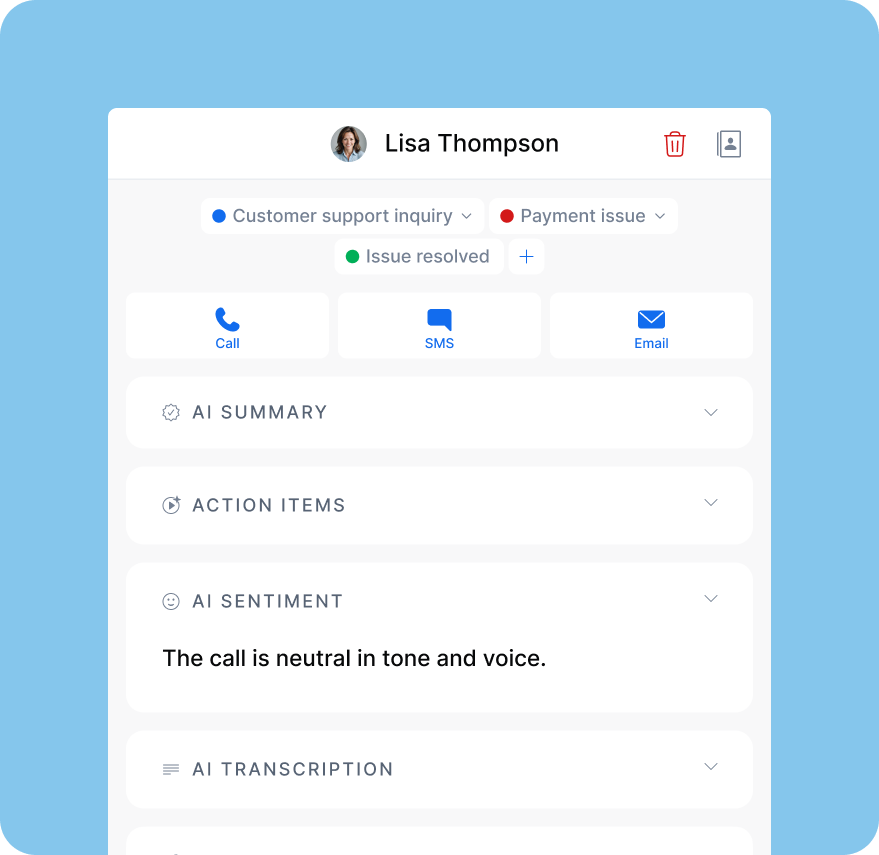
Business Messaging
Modern customers expect communication beyond voice. Business messaging enables you to manage SMS and WhatsApp messages from a single platform. By unifying conversations across multiple channels, you create a seamless experience for your customers while keeping your team’s communication organized and efficient.
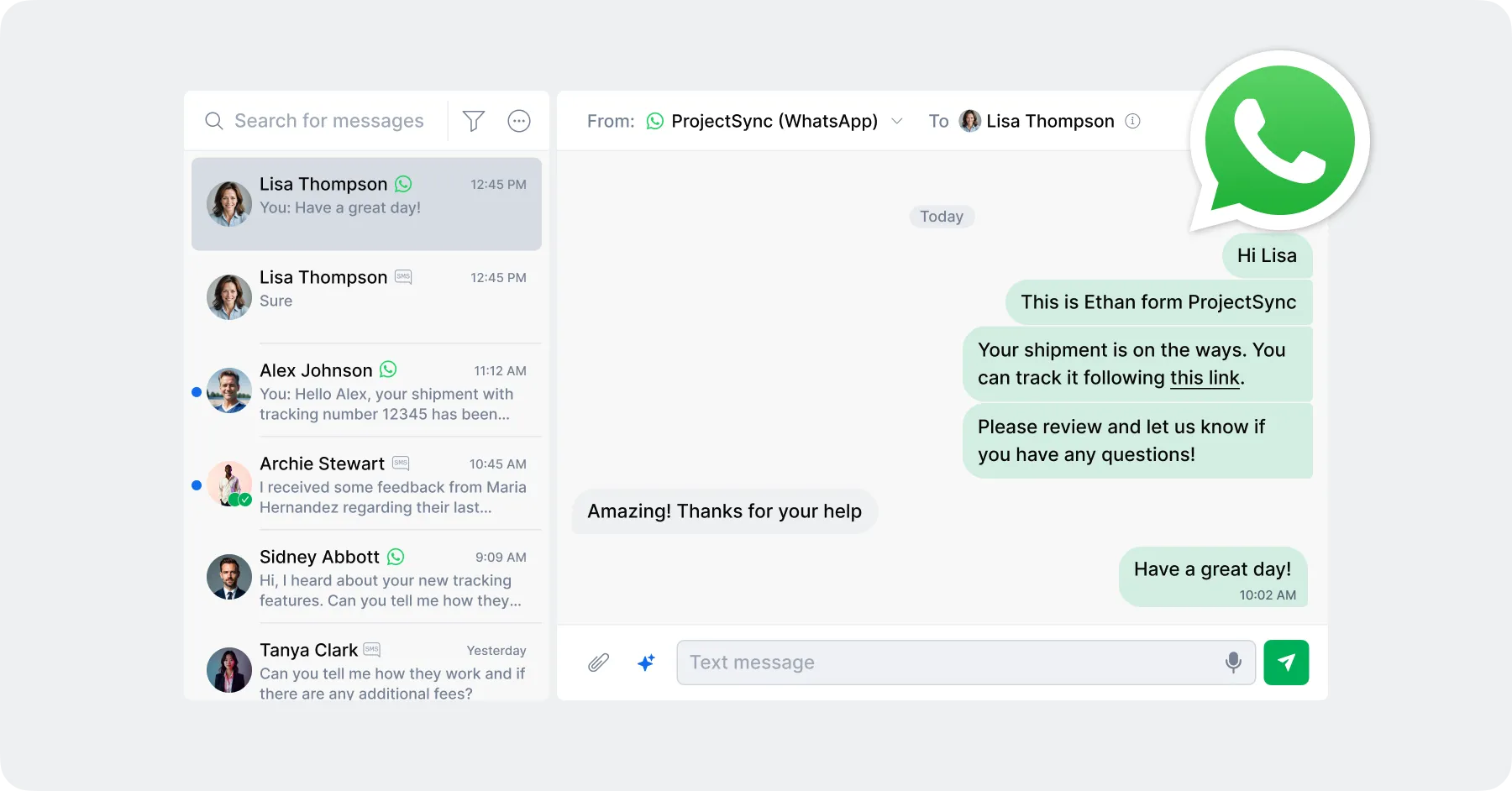
Conclusion
Not long ago, setting up a professional phone system meant heavy investments in hardware and dealing with the limits of desk-bound PBX setups. Today, those barriers are gone. A cloud phone system delivers everything traditional systems offered, and more, bringing flexibility, scalability, and cost efficiency that modern businesses expect.
Of course, adopting a cloud-based phone system requires careful consideration of factors like internet reliability, security, and provider selection. But for most SMBs and startups, the advantages far outweigh the challenges.
Whether you’re switching from an outdated system or adopting one for the first time, the provider you choose will make all the difference.
DialLink makes the transition effortless. Built for growing teams, our business phone system combines enterprise-grade features with an intuitive design and AI-powered automation. From launch to rapid scale, DialLink gives your business the tools to communicate seamlessly without the hassle.
Try DialLink free today and experience the full benefits of a cloud phone system.
A cloud phone system is a business communication solution hosted online instead of on physical hardware. It uses VoIP (Voice over Internet Protocol) technology to make and receive calls over the internet. This eliminates the need for landlines and on-premises PBX equipment, giving businesses access to advanced features with greater flexibility and lower costs.
With a reliable internet connection, call quality on a cloud phone system is often as good as or better than traditional phone lines. Features like HD voice provide clear, crisp audio, while providers typically build in redundancies to minimize dropped calls or disruptions.
Yes. Most cloud phone systems, like the one from DialLink, come with apps that work on smartphones, tablets, and laptops, allowing you to make and receive calls from anywhere with an internet connection. This makes it especially useful for remote teams and employees who travel frequently.
Absolutely. Most providers offer number porting, which allows you to transfer your existing business phone number to the cloud system. This ensures continuity for your customers and avoids the hassle of changing contact details.
Not necessarily. Cloud phone systems work with a variety of devices. You can use your existing smartphones, tablets, or computers with the provider’s app. If you prefer a traditional desk phone experience, many providers also support VoIP-enabled desk phones, but they’re optional, not required.
Featured Tags
Share
In this article
- What is Cloud Phone System?
- How Does a Cloud Based Phone System Work?
- Why Choose a Cloud Phone System for Small Business Communications?
- Benefits of a Cloud Based Phone System for Small Businesses
- Challenges of Using a Cloud Phone System
- Choosing the Best Cloud Based Phone System for Your Business
- Must-Have Features of a Cloud Phone System
- Advanced Cloud Phone System Features with DialLink
- Conclusion

Arina Khoziainova
Content Writer at DialLink
Arina is a content writer with over 7 years of experience in the IT industry. At DialLink, she creates clear, insightful content that helps small business and startup owners simplify communication and drive growth using modern tools. With a strong focus on practical value, Arina transforms complex topics into accessible, actionable stories.
Keep Reading

Google Voice Auto Attendant: What It Is and How It Works
Explore how Google Voice auto attendant works and whether it’s right for your small business.

Understanding Inbound Calls and How to Handle Them
Learn what inbound calls are, why they matter, and how to handle them efficiently.

What Is a VoIP Phone System?
Read about what a VoIP phone system is, how it outperforms traditional setups, and the main ways it’s used in everyday communication.

What Is a Virtual Phone System?
Learn what a virtual phone system is, how it works, and why it’s becoming the preferred communication solution for modern businesses.

What is Cloud Contact Center? Benefits, Features, and How It Works
A cloud-based call center offers small businesses a flexible and cost-effective alternative to traditional setups. Let’s explore what it is and how it operates.

Types of Business Phone Systems: Cloud, VoIP, PBX & More
Discover different types of business phone systems, how they differ, and which options may be the best fit for your business.

Google Voice Business Phone System: Features, Pricing, and Limitations for Small Businesses
Learn how the Google Voice business phone system works, explore plans, features, and limitations for small businesses and startups.

Auto Attendant Message Examples and Scripts for Small Businesses
Find a list of auto attendant message examples, samples, and scripts that you can use for your small business phone system.